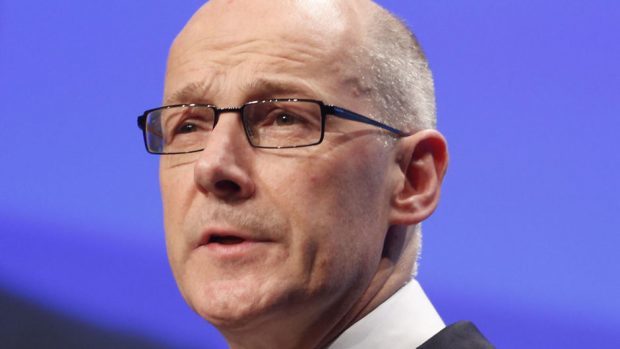John Swinney has admitted that high-profile cases in the Highlands show that the controversial Named Person scheme stops working if abusers simply opt out.
The deputy first minister said the service “relies on co-operation” of parents as he vowed to press forward with a nationwide roll-out of the Highland Council-developed scheme despite vocal opposition.
The Press and Journal revealed in June that tragic Inverness toddler Clyde Campbell had no contact with his Named Person in the year-and-a-half leading up to his cot death – because his mother Amanda Hardie asked the guardians to stay away.
Hardie, who repeatedly left the two-year-old unattended in her city flat in the run-up to his death, was jailed for 10 months in May, and a Highland Council review is under way into the case.
Last month, Fort Augustus woman Lanna Monaghan was jailed for more than three years for a catalogue of abuse on a another toddler, including shocking him with an electrified dog training collar.
The victim in that case also had an assigned Named Person, which is a health visitor until the child attends school, as the system has already been operating in the Highlands for six years.
Mr Swinney, the SNP education secretary, was quizzed about the cases by the Press and Journal while on a visit to Inverness yesterday.
He said: “Sadly there are very difficult situations, and, unfortunately, children sometimes come to harm and we have to do everything we possibly can to minimise that.
“But the examples that we’ve had of these cases demonstrate a significant amount of willingness of the individuals responsible not to co-operate with public authorities, and the named person service relies on co-operation.
“That is what it was founded upon, and we want to make sure that it’s rolled out for the benefit of young people across Scotland.”
The minister added that the “key evidence” from the Highland model was greater early intervention in situations where a youngster have difficulties, and a “very significant reduction in the number of children on the at-risk register, and the number of cases going to the Children’s Panel”.
He said: “These have been really significant achievements because of the early intervention activity that the named person service represents.
Mr Swinney also said that he remained “committed” to the policy, although it will not be rolled out nationally on the last day of August as initially planned, pending changes being made to comply with a European human rights legislation and a ruling by the UK Supreme Court.
Scottish Conservative shadow education secretary Liz Smith said: “If Named Person was just about co-operation, the SNP wouldn’t be in the mess it finds itself in.
“It’s an over-reaching policy which intrudes on family life, however Mr Swinney dresses it up.
“What the SNP should be admitting is every child in Scotland having a Named Person will dilute resources for those most in need.
“And that’s what really risks more of these tragic cases occurring.”
